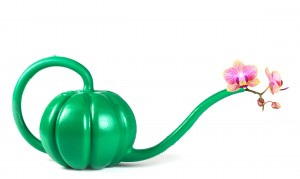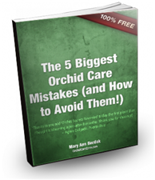 Orchids, like most plants, need the right amount of care in order to thrive and give off the lovely blooms that they are known for. Here are a few proven tips and tricks from expert growers on how to prevent orchid dehydration and keep your blooms vibrant and healthy.
Orchids, like most plants, need the right amount of care in order to thrive and give off the lovely blooms that they are known for. Here are a few proven tips and tricks from expert growers on how to prevent orchid dehydration and keep your blooms vibrant and healthy.
Trick 1: Avoid overwatering!
This may sound counter-intuitive, but keeping the roots dry is also key to avoiding dehydration. When roots are kept in a moist or wet environment at all hours of the day, root rot could easily take place. When this happens, the root system breaks down and the plant can no longer efficiently take in the water it needs. This, of course, leads to dehydration. Orchids prefer damp, not wet potting soil, so it is best to use potting mixes that have good drainage and to use pots with drainage holes so that the water has somewhere else to go.
Trick 2: Use a snug pot for repotting.
Use a snug pot if you are repotting your orchid so that the roots are packed closely together but not too snug that there is no air movement. If the roots are not tightly pressed against the walls of the container, then you are good to go. Make sure the pot has drainage holes and has good humidity to prevent waterlogging. Use a humidifier to keep humidity levels stable.
Trick 3: Use clear plastic pots
Clear plastic pots are ideal for orchids because they let you see the condition of the roots and they also let sunlight in, allowing sunlight to directly reach the roots. Clear plastic pots are lightweight and provide ample space for the roots, so it is also easier to pick up the plants if you want to examine the roots in close detail. Make sure that the pots have holes for good drainage.
Trick 4: Use shade cloth as sun protection
If you cannot move your plants into shadier areas, improvise using a sun shade or a sun cloth. You can even open an umbrella and place this over the orchids to protect them from direct sunlight. This is extremely crucial if you have orchid buds, since extreme temperatures can cause young, fragile buds to become dry, brittle and fall off.
Trick 5: Bamboo skewers for checking dry roots
This is a super cheap and easy way to know if your orchid needs watering. A common problem faced by many, especially those who are new to caring for orchids, is that they do not know when to water their plants. Some may be scared of over-watering which could lead to root rot, which is a legitimate concern. To prevent over-watering or under-watering, stick a bamboo skewer on the spot next to the orchid. Pull it out to see if it is damp or dry. If the stick is dry, you definitely should water it. In the summer, giving the plant a splash of water two or three times just to keep the plants and stem moist is also a good idea.
Trick 6: Have a handy water spray nearby
There are orchid variants that tend to dry up unevenly. Have a small water spray handy so you can give the plant a good spray when you see some parts drying up such as the stems and the leaves. In some cases, the roots will be moist and well-hydrated but the stems are going white and drying up. A handy water spray will take care of this problem. Your spray will also be useful for spraying aerial roots and keeping these from getting dehydrated.
Trick 7: Use flat stones in water for the right humidity
This a nifty trick to ensure that your orchids are raised in an environment with the right humidity. Orchids came from the rainforest, so they flower better when the humidity is just right. If you live in an area with dry heat, you need to ensure that humidity levels are right for your orchids to bloom. You can do this by covering a flat tray with flat, black stones and filling the tray with water so that the stones are almost covered. Place the pots on the stones. The rising water from the tray and the stones will provide the right amount of humidity for your orchids, even in dry and hot summer weather. You can get the same effect by simply spraying the surrounding areas, such as the table or the bench that the plant is on, with water to decrease ambient temperature and raise humidity.
What do you do to ensure that your orchids are not dehydrated? Leave us a comment below and let us know.




What Readers Are Saying